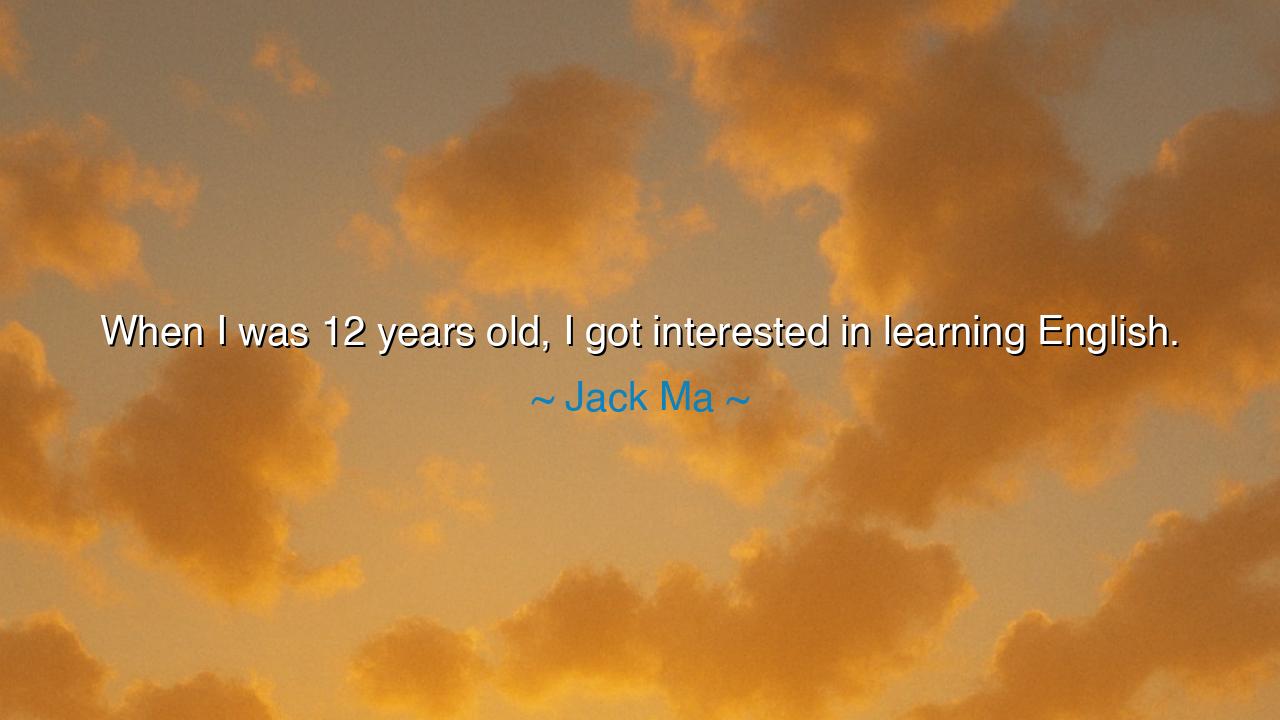
When I was 12 years old, I got interested in learning English.






When Jack Ma said, “When I was 12 years old, I got interested in learning English,” he spoke not merely of a boy’s curiosity but of the moment when destiny first whispered his name. In that small decision — to learn a new language — lay the seed of transformation that would one day connect a humble youth from Hangzhou to the entire world. This quote, simple as it may seem, carries within it a profound lesson about curiosity, perseverance, and the power of learning to change one’s fate. It is a reminder that greatness often begins not in grand ambitions, but in the quiet spark of fascination that ignites the young heart.
In ancient times, sages taught that “the journey of a thousand miles begins with a single step.” For Jack Ma, that step began with words — strange, foreign words spoken by travelers he met while riding his bicycle to a hotel every morning. The boy who guided tourists for free in exchange for conversation was unknowingly training his mind to cross borders long before airplanes carried him abroad. It was discipline born of passion, not of wealth or privilege. From those early mornings came the rhythm of a man who would later wake early to lead millions — a man who learned that learning itself is a bridge between worlds.
The power of language is not merely the power to speak, but to understand — to connect the hearts of strangers. Through English, Jack Ma came to know not just a foreign tongue, but the vastness of human experience. It opened his eyes to new ideas, cultures, and ways of thinking. In his words, we see the eternal truth that education is not a burden but a liberation. Like the philosophers of old who traveled to distant lands in search of wisdom, Ma’s childhood curiosity was his compass toward a global vision — one that would later give birth to Alibaba, a symbol of modern trade and technological unity.
Consider the story of another youth — Abraham Lincoln, who by the light of a single candle read borrowed books deep into the night. Both Lincoln and Ma shared the same secret: the willingness to learn beyond their means. Neither had wealth, yet both possessed intellectual hunger, that sacred fire that burns in those who believe knowledge can lift them from obscurity. The farmer’s son who studied law became a president; the Chinese boy who learned English became a world-renowned entrepreneur. The soil may differ, but the seed of perseverance blooms alike in all lands.
Jack Ma’s early fascination also reminds us of humility and persistence — for learning is never easy, and mastery is never swift. He failed entrance exams, was rejected from universities, and turned away from jobs, even as a teacher. Yet, the boy who once listened to foreign tourists did not lose faith in the power of communication. He understood what many forget: failure is not the opposite of success, but its foundation. Each defeat deepened his resolve, and each rejection sharpened his vision. The child who once said, “I got interested in learning English,” was, in truth, declaring, “I got interested in expanding the limits of who I can become.”
In the style of the ancients, let us see this not as a tale of one man, but as a parable for all who seek growth. When the young mind opens to curiosity, when it looks beyond comfort and familiarity, the future begins to unfold. For the mind that learns new words learns new worlds. Just as a single spark can kindle a thousand lanterns, so can a single interest, nurtured daily, illuminate a life. Every learner, every dreamer, carries this same power within them — the ability to rise above circumstance through the steady pursuit of wisdom.
So let the youth of today take heed: Do not wait for fortune or opportunity to come knocking. Begin with what you have — a book, a voice, a question — and follow it faithfully. Like Jack Ma at twelve, seek not only knowledge, but understanding; not only success, but connection. The lesson of his quote is eternal: greatness does not begin with genius, but with curiosity — with that simple moment when one says, “I want to learn.” For from that desire flows all transformation, and through it, one becomes not just a master of language, but a master of destiny itself.






AAdministratorAdministrator
Welcome, honored guests. Please leave a comment, we will respond soon